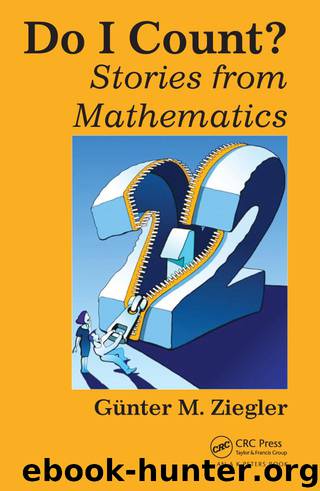Do I Count by Gunter M. Ziegler

Author:Gunter M. Ziegler
Language: eng
Format: epub
Tags: ISBN 10: 1466564911 ISBN 13: 9781466564916 ASIN: B00DV64PSS British National Bibliography System Number: 016385567 OCLC Number: 908078174 eISBN 10: 146656492X eISBN 13: 9781466564923 (PDF) Library of Congress Catalogue Card Number: 2013009573 Publisher: A. K. Peters/CRC Press (2013)
Published: 2015-06-11T16:00:00+00:00
Chapter 6
Where Mathematics Is Created
If one asks a mathematician about when and where some decisive idea came to life, one will rarely get a satisfactory answer. Mathematical ideas do not arise in a laboratory or other specific workplace, and only rarely do they come according to a plan or a well-laid session of intense thought. Instead, they arise at random points as little steps or larger jumps along a path that courses through the mathematician’s life.
To make mathematics, one does not need much. Paper and pencil are the standard tools (I prefer graph paper, a soft pencil, and an eraser), the thinking is done with the head, and the checking of computations takes place on the laptop. The equipment in a mathematics laboratory is modest and also portable. Serge Lang tells a nice story about an engineering department that received a letter from the dean: “Why do you need so much money for equipment? Why can you not be more like mathematicians, who need only pencils, paper, and erasers; or like the philosophers, who need only pencil and paper?” Someone who wants to develop ideas as a mathematician needs to find time to think, needs to follow trains of thought, needs to have peace and quiet or diversions, and needs to concentrate intensely or relax and think freely. To develop ideas as a mathematician, one needs to be able to take the mind on a trip. There is no general recipe for success. Mathematics is highly variegated, and mathematicians are multifarious, even if they are often just stereotyped as gray-haired eccentrics with thick glasses. The places in which mathematics is done reflect the great variety of mathematical thinking styles. Let us therefore make an excursion into this diversity and approach, anecdotally, answers to the questions of where and how mathematicians work, and where and how mathematics arises.
Download
This site does not store any files on its server. We only index and link to content provided by other sites. Please contact the content providers to delete copyright contents if any and email us, we'll remove relevant links or contents immediately.
The Infinite Retina by Robert Scoble Irena Cronin(6233)
Harry Potter and the Cursed Child: The Journey by Harry Potter Theatrical Productions(4487)
The Sports Rules Book by Human Kinetics(4374)
Molly's Game: From Hollywood's Elite to Wall Street's Billionaire Boys Club, My High-Stakes Adventure in the World of Underground Poker by Molly Bloom(3524)
A Knight of the Seven Kingdoms by George R R Martin(3306)
How To by Randall Munroe(3098)
Quidditch Through the Ages by J.K. Rowling(3096)
Flowers For Algernon by Daniel Keyes(3094)
Quidditch Through the Ages by J K Rowling & Kennilworthy Whisp(2960)
Stacked Decks by The Rotenberg Collection(2871)
Quidditch Through the Ages by Kennilworthy Whisp by J.K. Rowling(2843)
Quidditch through the Ages by J. K. Rowling(2790)
776 Stupidest Things Ever Said by Ross Petras(2768)
Quidditch Through The Ages by J. K. Rowling(2756)
Ready Player One: A Novel by Ernest Cline(2703)
What If?: Serious Scientific Answers to Absurd Hypothetical Questions by Randall Munroe(2691)
Beautiful Oblivion by Jamie McGuire(2596)
The Book of Questions: Revised and Updated by Gregory Stock Ph.d(2556)
Champions of Illusion by Susana Martinez-Conde & Stephen Macknik(2440)
